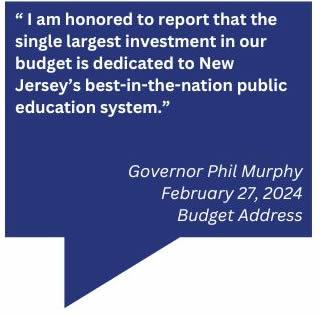- NJASA
- Executive View March 2024
-
New Jersey Schools: Funding Challenges and
Accountability ConcernsFunding Equity
New Jersey Governor Phil Murphy has consistently praised the state's education system, highlighting its achievements. While there is much to celebrate, funding distribution and accountability measures raise questions.
Governor Murphy's proposed budget allocates significant additional resources to schools, including:
- $908 million increase in overall aid
- Expanded access to preschool and free meals
- Support for teacher recruitment and mental health services
- Full funding of the state funding formula and pension obligations
These investments are positive, but a critical issue remains: funding equity. Despite the budget increase, 137 school districts face cuts, some substantial. This raises concerns about the fairness of the state's funding formula.
The New Jersey Association of School Administrators (NJASA) previously warned about this and recommended a review of the formula. Unfortunately, no action was taken. Last year's supplemental funding arrived in districts with approved applications midway through the school year, minimizing its impact on programs and services.
NJASA proposes solutions to address funding disparity for the coming fiscal year:- Capping annual state aid cuts: This would prevent districts from losing more than 1% of their previous year's budget, ensuring greater stability.
- Raising property tax caps: This would be targeted at districts where the school levy is below their Local Fair Share (LFS) and below adequacy under the SFRA, allowing them to invest more in education.
- Extending municipal overburden protections: This would provide additional financial support to non-Abbott and regional school districts.
These changes would create a more equitable funding system for all students. However, the NJ Legislature's willingness to implement these recommendations is unclear.
Accountability ConcernsAnother area of concern is accountability. The New Jersey Department of Education's (NJDOE) monitoring system, the NJQSAC, seems flawed. Reports suggest a record number of monitored districts might not meet Instruction and Program review standards and does not recognize growth in student achievement. This high potential failure rate contradicts Governor Murphy's claim of a "best-in-the-nation" system. NJASA is advocating for modifications to the system in collaboration with the NJDOE to ensure a fairer and more accurate assessment of school performance.
ConclusionNew Jersey invests heavily in education, but challenges remain. Ensuring equitable funding distribution and refining accountability measures are crucial for all students to succeed. NJASA is working with policymakers to address these issues and create a more robust education system for the state.



